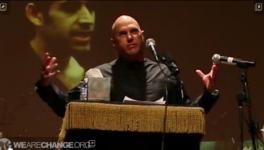Hounding Aaron Swartz to His Death
I was sitting with my friend Roy Singham, the founder of Thoughtworks two months back, discussing the need for social networking tools for organisations. Roy told me the exciting news that Aaron Swartz, the creator at age 14 of RSS feeds and one of the key figures in today's Internet world, was working on precisely such tools. It was a profound shock to learn that Aaron has committed suicide. At 26, Aaron leaves behind what very few people can achieve even in a lifetime. Aaron joins those that the US Government, the supposed champion of freedom on the Internet, is prepared to hound ruthlessly, if need be to their deaths. Bradley Manning, Julian Assange and Aaron are all victims of a society where stealing billions of dollars of public money does not earn even a gentle rap on the knuckles but freeing information is seen to be a danger for all that the US stands for.
Aaron was facing 35 years in jail and 1 million dollars in fines for trying to download the archives of JSTOR, the online repository of scientific and social sciences journals using the MIT network. His family in a statement have held the Massachusetts prosecutors responsible for his death, “"Aaron's death is not simply a personal tragedy. It is the product of a criminal justice system rife with intimidation and prosecutorial overreach. Decisions made by officials in the Massachusetts U.S. Attorney's office and at MIT contributed to his death. The US Attorney's office pursued an exceptionally harsh array of charges, carrying potentially over 30 years in prison, to punish an alleged crime that had no victims. Meanwhile, unlike JSTOR, MIT refused to stand up for Aaron and its own community's most cherished principles."
The digital commons and the Internet community are paying their tribute Aaron in different ways. Some like Tim Berners-Lee have mourned his passing, “Wanderers in this crazy world, we have lost a mentor, a wise elder”; some others have condemned the bullying prosecutors for hounding Aaron to his death. Lawrence Lessig, the founder of Creative Commons wrote, “Aaron was always and only working for (at least his conception of) the public good. He was brilliant, and funny. A kid genius. A soul, a conscience, the source of a question I have asked myself a million times: What would Aaron think? That person is gone today, driven to the edge by what a decent society would only call bullying.”
“Aaron did more than almost anyone to make the Internet a thriving ecosystem for open knowledge, and to keep it that way," wrote Peter Eckersley of Electronic Frontier Foundation.
Others have decided to take up the cause of digital freedom more directly. Micah Allen, a researcher in the fields of brain plasticity, cognitive neuroscience, and cognitive science called for dumping research papers in public domain, "A fitting tribute to Aaron might be a mass protest uploading of copyright-protected research articles," Allen wrote yesterday on Reddit. "Dump them on Gdocs, tweet the link. Think of the great blu-ray encoding protest but on a bigger scale for research articles." Already, people are using the hashtag #pdftributeaaronswartz or #pdftribute to upload such texts.
Anonymous has defaced MIT's webpages for its role and called his prosecution, "a grotesque miscarriage of justice" . It also called for “this tragedy to be a basis for reform of copyright and intellectual property law, returning it to the proper principles of common good to the many, rather than private gain to the few.”
Aaron in his young life had not only developed RSS feed, helped to set up the Creative Commons license, was a co-founder of Reddit, set up DemandProgerss, a digital rights group and was behind the hugely successful online protests that lead to defeating the Stop Online Piracy Act (SOPA) last year.
Aaron was convinced that knowledge and information should not be the property of a few corporations and hidden behind pay-walls. Early on, he took on PACER, the database of US Court judgements or case law. PACER charges 10 cents a page for what is effectively public domain information. He single handedly “liberated” 20% of PACER's documents. While his activities were put under the scanner, ultimately the US law authorities decided not to press charges.
His next brush was with MIT and JSTOR, the online store of academic articles. JSTOR has over 4.2 million articles, which is accessible only through paid subscriptions. There has been an ongoing battle over academic publications; the entire content, review, selection and even editing is done by the academic community free of any charge. But access to such material is only through paid copies or online subscriptions. Aaron decided to do something direct; he downloaded almost the entire JSTOR collection using a laptop connected to MIT's network.
Once this was discovered, the US Attorney's office swung into action. For them, it did not matter that JSTOR did not press charges and has even taken a decision a few weeks back to release into public domain a very large part of its archives. They went after Aaron for violating the Computer Fraud and Abuse Act passed in 1984. What the US government is protecting is information and knowledge as private property, also the core of SOPA. It is also making such acts not a matter of civil but criminal litigation.
Behind this harsh prosecution of Aaron lies a bigger fear that the US government has. More the information that is digitised within the government, more the potential of its becoming public. What Bradely Manning could take out from his computer and his network on a few CD's would have taken a number of trucks if they were hard copy documents. It is this digitisation of information and the information that the governments do not want their citizens to know that is now vulnerable to access using computer networks and even the Internet. As also all copyrighted material.
For the US government, this was therefore a test case of how far the Computer Fraud and Abuse Act could be stretched and the government’s ability to prosecute hackers. Freedom of the Internet is a welcome goal everywhere, but not in the US. Remember how vigorously the US “fought” for Internet freedom in the recent ITU conference in Dubai?
With Aaron's death, we have all lost a valued comrade in our fight for a digital commons. We cannot match his brilliance in creating new tools for the digital commons. But collectively, we can all fight the good fight for liberating information and knowledge from private hands. This should be our tribute to Aaron. As also fighting for a just society that does not penalise those who fight for public good while lauding those who steal from the public.
Disclaimer: The views expressed here are the author's personal views, and do not necessarily represent the views of Newsclick
Get the latest reports & analysis with people's perspective on Protests, movements & deep analytical videos, discussions of the current affairs in your Telegram app. Subscribe to NewsClick's Telegram channel & get Real-Time updates on stories, as they get published on our website.























